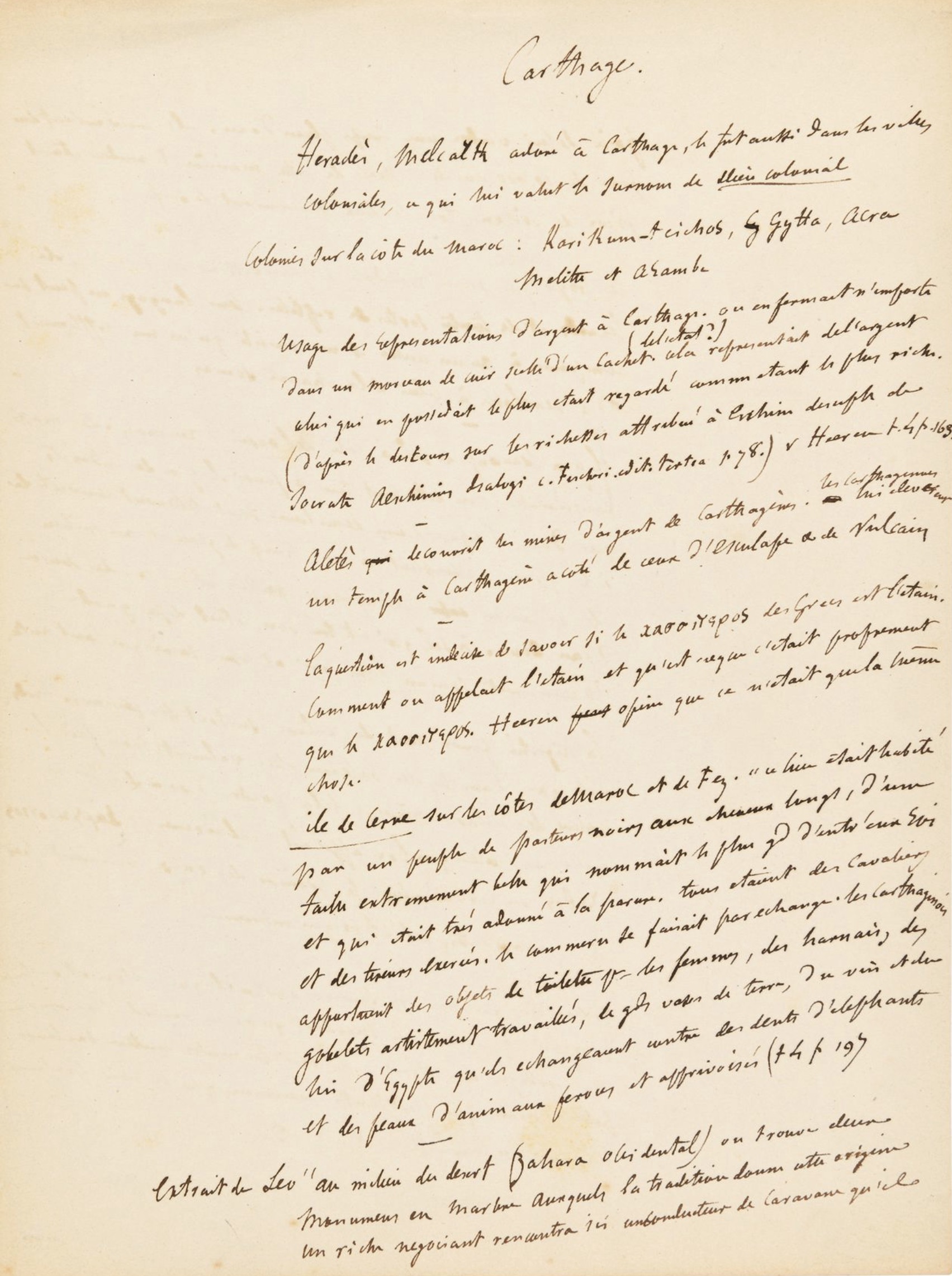Gustave Flaubert (1821.1880)
Autograph manuscript – Carthage.
Two folio pages.
Slnd [April or May 1857]
“I slept under the golden olive tree of Malkarth, patron of the Tyrian colonies. »
Magnificent and precious preparatory notes to Salammbô , concerning Punic civilization, taken from reading volume IV of the work devoted to Carthage by Arnold Hermann Ludwig Heeren, On the Politics and Commerce of the Peoples of Antiquity .
Immediately after the moral suffering born from the trial against Madame Bovary , in January 1857, Flaubert embarked on long research on Carthage, the scene of his novel in the making. “ I need to rid myself of all the contemporary turpitudes in which I have been made to flounder this winter [Bovary trial], and to no longer think about the bourgeois, to no longer paint and to no longer see them . I thirst for a higher environment . »
Heeren's book was one of Flaubert's first readings, as evidenced by his letter to Jules Michelet of March 1, 1857 .
The notes presented here were used directly in the writing of Flaubert's historical novel published – more than five years after the first drafts – on November 24, 1862 by Michel Lévy, and offer a fascinating insight into the creative process and rigor of the French writer.
____________________________
Carthage.
Heracles, Melcarth worshiped in Carthage, was also worshiped in the colonial cities, which earned him the nickname Colonial God . [We find, in chapter III, this passage where Salammbô says: “I slept under the golden olive tree of Malkarth, patron of the Tyrian colonies. »]
Colonies on the coast of Morocco: (…) Gytta, Acra, Melitre and Aramba.
Use of silver representations in Carthage. Anything was locked in a piece of leather sealed with a seal. That was money. The one who had the most was considered the richest. (according to the speech on riches attributed to Aeschines, disciple of Socrates…) v. Heeren t.4 p. 163. [ This practice, reported in the Dialogues of Aeschines, is mentioned in chapter II of Salammbô: “As for the pay of the Mercenaries, it filled, approximately, two baskets of esparto; we even saw, in one, those leather discs which the Republic used to save money. »]
Aletès discovered the silver mines of Cartagena. The Carthagenes built a temple for him in Cartagena alongside those of Aesculapius & Vulcan. [Allude to this character in chapter VII of Salammbô: “Bronze scales covered the walls; in the middle, on a granite pedestal, stood the statue of a Kabyre with the name of Aletès, inventor of mines in Celtiberia. » ]
The question is undecided whether the κασσίτερος of the Greeks is tin. What was tin called and what κασσίτερος actually was. Heeren agrees that it was just the same thing. » [This material is mentioned in the same chapter VII: “Bronze plates, silver ingots and iron bars alternated with tin salmon brought from the Cassiterides by the Dark Sea. »]
Cerne Island on the coasts of Morocco and Fez. “This place was inhabited by a people of black pastors with long hair (…) who called the greatest of them Self and who were very fond of laziness. All were trained horsemen and marksmen. Commerce was done by exchange. The Carthaginians brought toiletries for women , harnesses, artistically crafted goblets, large earthenware vases, wine and Egyptian linen which they exchanged for elephant teeth and animal skins. fierce and tame t4 p197).
Extract from Lev “in the middle of the desert (Western Sahara) we find two marble monuments to which tradition gives this origin. A rich merchant here met a caravan driver whom he urged to sell him a cup full of water. They agreed on the price of 10,000 ducats; but in this way the driver being deprived of drink, both died of thirst.
Troglodytes according to Herodotus feed on snakes, lizards and all kinds of reptiles. Their language cannot be compared to any other and consists only of a whistling sound quite similar to that of the bat.
____________________________
Gustave Flaubert continues his notes by noting details on the salt of the oasis of Ammon, the precious foodstuffs originating from black Africa, the mules in Africa.
Magnificent document in perfect state of conservation.
Bibliography:
. On the Politics and Trade of the Peoples of Antiquity. Arnold Hermann Ludwig Heeren. (Paris, Firmin Didot brothers, 1832).
. Flaubert correspondence. Pleiades. Volume III.

